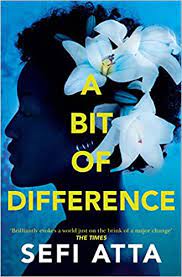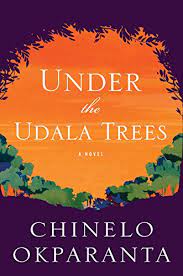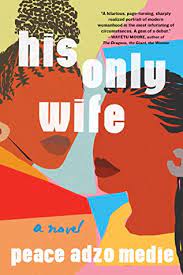Contemporary African fiction – reviews in brief
Since starting this blog, I have been on a journey to expand my reading horizons. These days, I read very few dead white men – if anything I read a majority of living women. But they’re still mostly white, mostly writing in English. I’ve been gradually increasing the translations in my reading mix, especially contemporary translation, but in the last couple of years I became aware of a glaring gap in my bookshelves: African fiction.
I’ve read some of the big hitters – Chinua Achebe, Ahdaf Soueif – but I have almost certainly read more books by white Europeans about Africa than books by African authors. Which is not great. So I looked up some lists of recommended books and authors. Here are mini reviews of three recent novels by African women that I have enjoyed.
 A Bit of Difference by Sefi Atta
A Bit of Difference by Sefi Atta
This novel directly addresses the fact that most Americans and Europeans largely know Africa solely as a receiver of charity, and that the way many US and European charities operate in Africa is an extension of colonialism – patriarchal, failing to involve or even listen to local knowledge, and often causing as many (or more) problems as they solve.
Deola, a Nigerian expatriate in London, is sent on a work trip to Nigeria that manages to coincide with her father’s five-year memorial service. Her job is for an NGO so she is forced to confront realities about the role of international charities in her native country. She also has to face family issues, old friendships and a budding relationship that makes her question a lot of things about her life.
“Her TV remote is on the carpet by a glass with orange juice sediment and a side plate with the remnants of her bacon sandwich. She is relishing the taste of acid and salt in her mouth when her doorbell rings. The ding is loud, but the dong is broken and drops like a thud.”
I enjoyed this book but I didn’t feel I really got to know Deola. I learned a lot about her life and her job, but less so her as a person. I did however really feel a vivid sense of place.
Published 2012 by Spinifex Press.
 Under the Udala Trees by Chinelo Okparanta
Under the Udala Trees by Chinelo Okparanta
Another Nigerian novel, but with very different subject matter. It opens during Nigeria’s civil war. Following the death of her father, Ijeoma, aged 11, is sent away to work as a housemaid far from the fighting and ends up staying long after peace arrives. Initially this is the main thrust of the novel – Ijeoma’s separation from her mother and coming to terms with that.
While there she meets another displaced child and they fall in love. They are from different ethnic communities. They are also both girls. At the time (1960s and 1970s) that was a dangerous situation to be in. Ijeoma is Christian and has to reconcile her faith with her identity. She learns that she must hide her sexuality but as she gets older, repressing her true self only gets harder. She’s not outspoken or trailblazing, she just wants to quietly live her own authentic life.
“Mama said, ‘Everybody knows what lesson we should take from that story. Man must not lie with man, and if man does, man will be destroyed. Which is why God destroyed Sodom and Gomorrah.’
‘It couldn’t have been because they were selfish and inhospitable and violent?’ I asked. ‘It has to be that other thing?’
‘Yes,’ Mama said. ‘It had to be that other thing.’”
This sounds like a tough read but it was much more enjoyable than might be expected. The writing is beautiful and Ijeoma is a compelling lead character.
Published 2015 by Houghton Mifflin Harcourt.
 His Only Wife by Peace Adzo Medie
His Only Wife by Peace Adzo Medie
In this novel set in Ghana, a young woman called Afi is set up with what appears to be a marriage beyond her dreams and moves from her village to a fancy apartment in Accra. But Afi discovers there is a reason her husband’s family was so keen to add her to their ranks, and she must significantly adjust her expectations of both Accra and marriage itself.
The novel opens with the line “Elikem married me in absentia; he did not come to our wedding.” This is what Afi faces, and she faces it with high hopes and good humour, as well as trepidation. She knows there is another woman in the picture, one Elikem’s family, the Ganyos, do not approve of. She also knows that she and her mother are virtually dependent on the Ganyos, who provide their home and her mother’s job.
Afi tries her best to be practical and make the best of the situation while she figures out exactly what that situation is. She quickly gets used to living in luxury but finds it lonely not being surrounded by extended family. Though that does have its perks, getting her away from her controlling mother, as well as her Uncle Pious, a character who provides some comic relief but also some of the worst misogyny in the novel.
“She had seemed so straightforward and open about her own life that I had left her flat feeling like I had known her for a long time. My mother would surely dislike her if they ever met. A person who talks so freely about her own life will talk just as freely about yours, I imagined her saying.”
I enjoyed this book, which explores the patriarchal nature of many traditions without entirely dismissing them. It’s funny but Medie judges the right moments to be serious, as Afi’s situation is not a laughing matter.
Published 2020 by Algonquin Books.
Having just looked up these authors again, I see that two are currently living in the US and the other in the UK (in Bristol, as it happens). I wonder if it is inevitable that the African authors whose books are available in English in the UK are those who have moved here or the US, or if that is a coincidence. I would certainly appreciate recommendations of contemporary African books available in English by authors who still live in their native country.